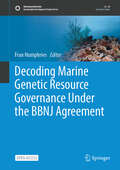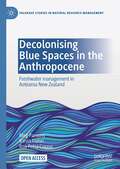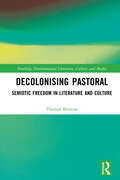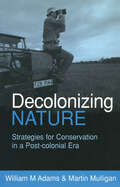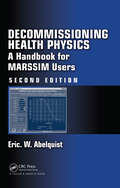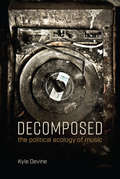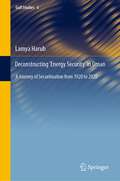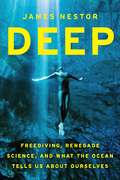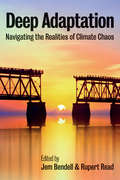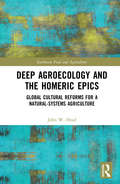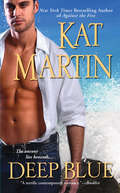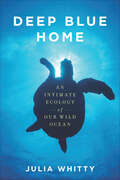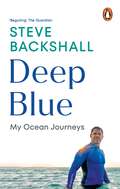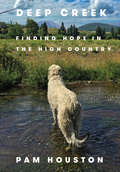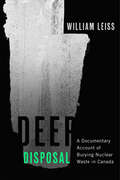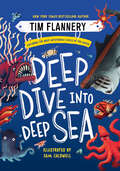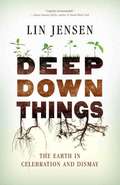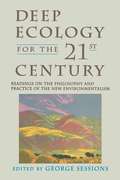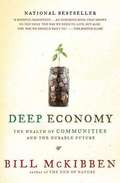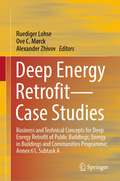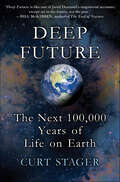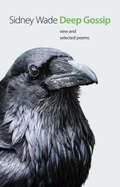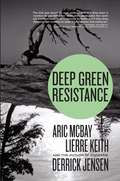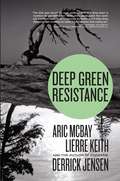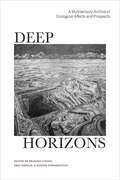- Table View
- List View
Decoding Marine Genetic Resource Governance Under the BBNJ Agreement (Sustainable Development Goals Series)
by Fran HumphriesThis open access book provides practical guidance for understanding the new treaty adopted in June 2023 that will change the way biodiversity is governed in about two thirds of the oceans known as areas beyond national jurisdiction (ABNJ). The Agreement under the United Nations Convention on the Law of the Sea on the Conservation and Sustainable Use of Marine Biological Diversity of Areas Beyond National Jurisdiction is an achievement for global cooperation in conservation, sustainability and equity. The treaty provisions in Part II on Marine Genetic Resource (MGR) governance were the most contentious element of negotiations, resulting in significant innovation and compromise. It has an ambitious framework with many details yet to be fleshed out after the treaty comes into force. There is no comprehensive guidance for stakeholders about what the treaty means for their current and future research and development (R&D) and commercialisation of MGR of ABNJ, digital sequence information and associated traditional knowledge. Through a detailed commentary and real world examples, this book interprets and analyses the treaty text to offer practical considerations, guidelines and tools to assist policy makers as well as scientists and commercial end users to align their R&D practices with the expected implementation of the treaty.
Decolonising Blue Spaces in the Anthropocene: Freshwater management in Aotearoa New Zealand (Palgrave Studies in Natural Resource Management)
by Karen Fisher Meg Parsons Roa Petra CreaseThis open access book crosses disciplinary boundaries to connect theories of environmental justice with Indigenous people’s experiences of freshwater management and governance. It traces the history of one freshwater crisis – the degradation of Aotearoa New Zealand’s Waipā River– to the settler-colonial acts of ecological dispossession resulting in intergenerational injustices for Indigenous Māori iwi (tribes). The authors draw on a rich empirical base to document the negative consequences of imposing Western knowledge, worldviews, laws, governance and management approaches onto Māori and their ancestral landscapes and waterscapes. Importantly, this book demonstrates how degraded freshwater systems can and are being addressed by Māori seeking to reassert their knowledge, authority, and practices of kaitiakitanga (environmental guardianship). Co-governance and co-management agreements between iwi and the New Zealand Government, over the Waipā River, highlight how Māori are envisioning and enacting more sustainable freshwater management and governance, thus seeking to achieve Indigenous environmental justice (IEJ). The book provides an accessible way for readers coming from a diversity of different backgrounds, be they academics, students, practitioners or decision-makers, to develop an understanding of IEJ and its applicability to freshwater management and governance in the context of changing socio-economic, political, and environmental conditions that characterise the Anthropocene.
Decolonising Pastoral: Semiotic Freedom in Literature and Culture (Routledge Environmental Literature, Culture and Media)
by Thomas BristowThis book offers an interdisciplinary exploration of pastoral, a genre that has captured the Western imagination for centuries, across literature, art and music. Combining the practices of literary criticism and creative writing, Decolonising Pastoral develops a new series of tools for the project of the environmental humanities. With an emphasis on subjectivity and experience, essays and fictocriticism are woven with scholarship and stories to create a fresh critical framework. Six chapters focus on laying out a new synthetic methodology, taking readers on a journey across literary genres, forms and modes, to explore nature both as an organic totality that encompasses mind and matter, and as a source of cultural expression and production. Beginning with an introduction to biosemiotics, the text progresses onto the blue humanities, synthetic criticism and metrics for decolonising pastoral, before uniting the threads together. It discusses works from diverse writers such as Thea Astley, Judith Wright, Ted Banfield, Xavier Herbert, Alexis Wright, Sylvia Plath, T.S. Eliot, Seamus Heaney, W.H. Auden, Percy Bysshe Shelley, William Wordsworth, William Blake, John Milton and William Shakespeare.This ambitious and experimental methodology, developing where creative writing and literary criticism meet, will be an important read for scholars, researchers and students interested in literature, ecology, environmental studies and language.
Decolonizing Nature: Strategies for Conservation in a Post-colonial Era
by Martin Mulligan William (Bill) AdamsBritish imperialism was almost unparalleled in its historical and geographical reach, leaving a legacy of entrenched social transformation in nations and cultures in every part of the globe. Colonial annexation and government were based on an all-encompassing system that integrated and controlled political, economic, social and ethnic relations, and required a similar annexation and control of natural resources and nature itself. Colonial ideologies were expressed not only in the progressive exploitation of nature but also in the emerging discourses of conservation. At the start of the 21st century, the conservation of nature is of undiminished importance in post-colonial societies, yet the legacy of colonial thinking endures. What should conservation look like today, and what (indeed, whose) ideas should it be based upon? Decolonizing Nature explores the influence of the colonial legacy on contemporary conservation and on ideas about the relationships between people, polities and nature in countries and cultures that were once part of the British Empire. It locates the historical development of the theory and practice of conservation - at both the periphery and the centre - firmly within the context of this legacy, and considers its significance today. It highlights the present and future challenges to conservationists of contemporary global neo-colonialism The contributors to this volume include both academics and conservation practitioners. They provide wide-ranging and insightful perspectives on the need for, and practical ways to achieve new forms of informed ethical engagement between people and nature.
Decommissioning Health Physics: A Handbook for MARSSIM Users, Second Edition
by Eric W. AbelquistExperienced Guidance on the Technical Issues of Decommissioning ProjectsWritten by one of the original MARSSIM authors, Decommissioning Health Physics: A Handbook for MARSSIM Users, Second Edition is the only book to incorporate all of the requisite technical aspects of planning and executing radiological surveys in support of decommissioning. Exte
Decomposed: The Political Ecology of Music (The\mit Press Ser.)
by Kyle DevineThe hidden material histories of music.Music is seen as the most immaterial of the arts, and recorded music as a progress of dematerialization—an evolution from physical discs to invisible digits. In Decomposed, Kyle Devine offers another perspective. He shows that recorded music has always been a significant exploiter of both natural and human resources, and that its reliance on these resources is more problematic today than ever before. Devine uncovers the hidden history of recorded music—what recordings are made of and what happens to them when they are disposed of. Devine's story focuses on three forms of materiality. Before 1950, 78 rpm records were made of shellac, a bug-based resin. Between 1950 and 2000, formats such as LPs, cassettes, and CDs were all made of petroleum-based plastic. Today, recordings exist as data-based audio files. Devine describes the people who harvest and process these materials, from women and children in the Global South to scientists and industrialists in the Global North. He reminds us that vinyl records are oil products, and that the so-called vinyl revival is part of petrocapitalism. The supposed immateriality of music as data is belied by the energy required to power the internet and the devices required to access music online. We tend to think of the recordings we buy as finished products. Devine offers an essential backstory. He reveals how a range of apparently peripheral people and processes are actually central to what music is, how it works, and why it matters.
Deconstructing ‘Energy Security’ in Oman: A Journey of Securitisation from 1920 to 2020 (Gulf Studies #6)
by Lamya HarubThis book makes a substantial and timely contribution to discussions on energy security in Oman, providing a systematic analysis of energy security in Oman from 1920 to 2020. It is particularly relevant in light of the recent global geopolitics of the Gulf particularly, and the Middle Eastern region broadly, as well as connecting to current climate change research and debates. Combining a political sociological account with postcolonial concepts within a theoretical and empirical exploration of energy politics, the book weaves a study of energy security into the historical and contemporary development of political, economic, security, and social structures in Oman. Including interviews with Omani and Oman-based practitioners, as well as grounded in historical documents which include Arabic-language sources, this book evaluates the energy question beyond the typical economic perspective, considering socio-political opportunities and challenges. It also makes economic-related recommendations in tandem with rentier state theory. Unlike the dominant accounts of energy security in Oman, this book sets itself apart by moving away from utilising liberal and realist approaches for its analysis and engages systematically with critical security studies to introduce a non-Eurocentric perspective to the arena. Of interest to scholars in Middle Eastern history, energy security, and security studies, this book assumes an important place in the critical literature on the Gulf, particularly within environmental studies and energy policy literature.
Deep
by James NestorWhile on assignment in Greece, journalist James Nestor witnessed something that confounded him: a man diving 300 feet below the ocean's surface on a single breath of air and returning four minutes later, unharmed and smiling.This man was a freediver, and his amphibious abilities inspired Nestor to seek out the secrets of this little-known discipline. In Deep, Nestor embeds with a gang of extreme athletes and renegade researchers who are transforming not only our knowledge of the planet and its creatures, but also our understanding of the human body and mind. Along the way, he takes us from the surface to the Atlantic's greatest depths, some 28,000 feet below sea level. He finds whales that communicate with other whales hundreds of miles away, sharks that swim in unerringly straight lines through pitch-black waters, and seals who dive to depths below 2,400 feet for up to eighty minutes--deeper and longer than scientists ever thought possible. As strange as these phenomena are, they are reflections of our own species' remarkable, and often hidden, potential--including echolocation, directional sense, and the profound physiological changes we undergo when underwater. Most illuminating of all, Nestor unlocks his own freediving skills as he communes with the pioneers who are expanding our definition of what is possible in the natural world, and in ourselves.
Deep Adaptation: Navigating the Realities of Climate Chaos
by Rupert Read Jem Bendell‘Deep adaptation’ refers to the personal and collective changes that might help us to prepare for – and live with – a climate-influenced breakdown or collapse of our societies. It is a framework for responding to the terrifying realization of increasing disruption by committing ourselves to reducing suffering while saving more of society and the natural world. This is the first book to show how professionals across different sectors are beginning to incorporate the acceptance of likely or unfolding societal breakdown into their work and lives. They do not assume that our current economic, social and political systems can be made resilient in the face of climate change but, instead, they demonstrate the caring and creative ways that people are responding to the most difficult realization with which humanity may ever have to come to terms. Edited by the originator of the concept of deep adaptation, Jem Bendell, and a leading climate activist and strategist, Rupert Read, this book is the essential introduction to the concept, practice and emerging global movement of Deep Adaptation to climate chaos.
Deep Agroecology and the Homeric Epics: Global Cultural Reforms for a Natural-Systems Agriculture (Earthscan Food and Agriculture)
by John W. HeadDrawing on the Homeric epics, this multidisciplinary work reveals the cultural transformations which need to take place in order to transition from today’s modern extractive agricultural system to a sustainable natural‐systems agriculture. In order to provide an imaginative foundation on which to build such a cultural transformation, the author draws on the oldest and most pervasive pair of literary works in the Western canon: the Iliad and the Odyssey. He uses themes from those foundational literary works to critique the concept of state sovereignty and to explain how innovative federalism structures around the world already show momentum building toward changes in global environmental governance. The book proposes a dramatic expansion on those innovations, to create eco‐states responsible for agroecological management. Drawing from many years of experience in international institutions, the author proposes a system of coordination by which an international agroecology‐focused organization would simultaneously (i) avoid the shortcomings of the world’s current family of powerful global institutions and (ii) help create and implement a reformed system of local landscape‐based agriculture wholly consistent with ecological principles. Acknowledging the difficulty of achieving reforms such as these, the author suggests that a new cultural‐conceptual narrative can be constructed drawing on values set forth 2,700 years ago in the Homeric epics. He explains how these values can be reimagined to drive forward our efforts in addressing today’s the climate and agricultural crises in ways that reflect, not reject, the natural processes and relationships that make the Earth a living planet. This book will be of great interest to students, academics and policymakers addressing issues of agrarian values, environmental and agricultural law, environmental restoration, agroecology, and global institutional reform.
Deep Blue (Sinclair Sisters Trilogy #3)
by Kat Martin&“Sexy romance sizzles&” in the third novel featuring adventure-seeking sisters from the New York Times bestselling author of Desert Heat (Publishers Weekly). For reporter Hope Sinclair, writing about the recovery of a sunken Spanish treasure off Pleasure Island should be her big break. Yet Hope can&’t help feeling she&’s been hand-picked for this job for all the wrong reasons. Someone wants Hope out of New York—and off a story that could blow a corruption case wide open. But if they think sending her to paradise will shut her up, they&’ve got another thing coming . . . Treasure hunter and former Navy SEAL Conner Reese isn&’t happy to have Hope along for the ride. He doesn&’t need the publicity, nor does he want a gorgeous redhead driving his crew—and himself—to distraction. But there&’s something else. Conner can sense extreme danger, and danger is following Hope Sinclair very, very closely . . . Praise for Kat Martin &“Kat Martin is a fast gun when it comes to storytelling, and I love her books.&” —Linda Lael Miller, #1 New York Times bestselling author &“A terrific storyteller.&” —Booklist &“It doesn&’t matter what Martin&’s characters are up against—she dishes up romantic suspense, sizzling sex and international intrigue.&” —RT Book Reviews &“[A] master of suspenseful romance.&” —Publishers Weekly
Deep Blue Home: An Intimate Ecology of Our Wild Ocean
by Julia Whitty“A lovely, soft-spoken book about the ‘joy, inspiration, wonder, laughter, ideas’ that come from relating to Earth’s ‘nonhuman world.’”—Kirkus Review“Here is a writer of power and persuasion; one worthy of the Rachel Carson mantle. Whitty allows us to peer into the ecological web of the mysterious World Ocean, sharing her passion for the continuation of the ocean's life-essential fabric.”—Linda Lear, author of Rachel Carson: Witness for Nature “Rhythmic, poetic, transporting, and illuminating, this is the sacred memoir of a woman among islands of miracles, yearning with all her heart to be right where she is.”—Carl Safina, author of Song for the Blue Ocean, The View From Lazy Point“An illuminating exploration of the swirling currents connecting oceans, science, people, and history, bearing the reader on a unique voyage of discovery above and below the waves.”—Daniel Bennett, President of The Explorers Club —
Deep Blue: My Ocean Journeys
by Steve BackshallTake a deep breathSteve Backshall was nine years old the first time he saw a shark, while on holiday with his family in Malaysia. It was the beginning of a life-long fascination with these 'lords of the sea', and the oceanic life around them. His career as one of the world's most popular naturalists and explorers has taken him to countless underwater places, many never before seen by others. And he's also been witness to the startling decline in fortune of our oceans' wild inhabitants over the past fifty years.Deep Blue is a book a lifetime in the making: a remarkable blend of memoir, travel, and marine and environmental science that takes us on an unforgettable tour of the many worlds of aquatic life: from underwater deserts and rainforests to the evolution of ocean heroes like the sea turtle and the Great White, from the genesis of ocean life to the rapidly declining state of white polar seas and coral reefs. It's both a love letter to our precious oceans and rallying cry for what we must to do save them.
Deep Creek: Finding Hope In The High Country
by Pam HoustonWinner of the 2020 Reading the West Advocacy Award Winner of the 2020 Colorado Book Award for Creative Nonfiction "This is a book for all of us, right now." —Cheryl Strayed, author of Wild On her 120-acre homestead high in the Colorado Rockies, beloved writer Pam Houston learns what it means to care for a piece of land and the creatures on it. Elk calves and bluebirds mark the changing seasons, winter temperatures drop to 35 below, and lightning sparks a 110,000-acre wildfire, threatening her century-old barn and all its inhabitants. Through her travels from the Gulf of Mexico to Alaska, she explores what ties her to the earth, the ranch most of all. Alongside her devoted Irish wolfhounds and a spirited troupe of horses, donkeys, and Icelandic sheep, the ranch becomes Houston’s sanctuary, a place where she discovers how the natural world has mothered and healed her after a childhood of horrific parental abuse and neglect. In essays as lucid and invigorating as mountain air, Deep Creek delivers Houston’s most profound meditations yet on how “to live simultaneously inside the wonder and the grief… to love the damaged world and do what I can to help it thrive.”
Deep Disposal: A Documentary Account of Burying Nuclear Waste in Canada
by William LeissCanada is one of many countries around the world that use nuclear reactors to generate electrical power, in part to reduce our carbon footprint. Yet this energy produces hazardous, long-lived waste that emits dangerous radioactivity for tens of thousands of years.Nuclear waste, stored temporarily for decades, must be safely disposed of so it will not pose a serious threat to human health and the environment. This means placing it in locations deep underground in granite, sedimentary rock, or clay. Canada’s ideal location is somewhere on the Canadian Shield, the 2.5-billion-year-old crystalline rock that undergirds much of the country. Beginning in 2010 some twenty-two communities, most in Ontario, volunteered to host the repository. In Deep Disposal William Leiss explains the challenges that have arisen in the evaluation of potential sites over the last decade.High-level nuclear waste is the most hazardous byproduct of an energy source that is incredibly useful and increasingly in demand. Finding the ideal place to store it permanently is an urgent policy crisis facing our country. Deep Disposal reveals the nature of this crisis and how we might overcome it.
Deep Dive into Deep Sea: Exploring The Most Mysterious Levels Of The Ocean
by Tim FlanneryInternationally renowned author and scientist Tim Flannery explores the most remote and mysterious levels of Earth’s oceans. Who is the giant squid’s mortal enemy? Can you see ghosts in the deep sea? What in the world is a headless chicken monster? Tim Flannery has the answers. In this informed and accessible book, he takes readers on a journey into the darkest depths of this unchartered realm to learn about the incredible creatures living there. Divided into sections that focus on the various depths of the ocean, readers can navigate their way through the sea while being guided by anecdotes from Tim’s own personal experiences. From hairy sea devils and goblin sharks to entire ecosystems within whale carcasses, he uncovers fascinating and bizarre facts about this enchanting place and the slippery, scaly, and strange creatures that live there. Packed with vibrant illustrations and snappy engaging text, Deep Dive into Deep Sea will enthrall, enlighten, and capture the imaginations and passions of young oceanographers.
Deep Down Things
by Lin JensenBeloved and critically acclaimed author Lin Jensen returns with this bounteous volume exploring what the poet Gerard Manley Hopkins calls "deep down things." Richly informed by deep ecology, Lin's writing explores our intimate connection to the land, to the specificities of place, and to the living earth itself-all as Lin uncovers our own deepest nature, the true heart of what it means to be human. There is much in what's happening in our environment now that can and perhaps should be cause for dismay - and Deep Down Things looks squarely at all of this and nonetheless gives us ample cause for celebration.
Deep Ecology for the 21st Century
by George SessionsEvery day, in newspapers and on television, we read and hear about the ongoing destruction of the environment: the greenhouse effect, ozone layer depletion, deforestation, and air and water pollution. Deep Ecology offers a solution to the environmental crisis through a radical shift in human consciousness, a fundamental change in the way people relate with the environment. Instead of thinking of nature as a resource to be used for human needs, Deep Ecology argues that the true value of nature is intrinsic and independent of its utility. Emerging in the 1980s as an influential philosophical, social, and political movement, Deep Ecology has shaped the environmental debate among leading activists and policymakers-from former Vice-President Al Gore to Dave Forman, cofounder of Earth First! Deep Ecology for the Twenty-First Century contains thirty-nine articles by the leading writers and thinkers in the filed, offering a comprehensive array of perspectives on this new approach to environmentalism, exploring: The basic philosophy of Deep Ecology. Its roots in the writings of Henry David Thoreau, John Muir and Rachel Carson. The relationship of Deep Ecology to social ecology, ecofeminism, the Greens, and New Age futurism. How Deep Ecology as a way of life is exemplified by two important environmentalists: poet Gary Snyder and Norwegian philosopher Arne Naess. The philosophical dimensions of this environmental movement by its leading theorist. The politics of ecological sustainability and the social and political implications of Deep Ecology for the next century.
Deep Economy: The Wealth of Communities and the Durable Future
by Bill MckibbenPopular environmental writer McKibben shows how global warming and other environmental problems are related to the concepts and practices of consumer and corporate capitalism, and suggests how to move beyond the bind.
Deep Energy Retrofit—Case Studies: Business and Technical Concepts for Deep Energy Retrofit of Public Buildings; Energy in Buildings and Communities Programme; Annex 61, Subtask A
by Alexander Zhivov Ruediger Lohse Ove C. MørckThis book describes results of research conducted with the goal of providing a framework, selected tools, and guidelines to significantly reduce energy use (by more than 50%) in government and public buildings. The scope of the book is limited to public buildings that were constructed before the 1980s with low internal loads (e.g., office buildings, dormitories, barracks, public housing, and educational buildings) and that were undergoing major renovation. The book contains description and analysis of 26 well-documented case studies from Europe (Austria, Denmark, Estonia, Germany, Ireland, Latvia, Montenegro, The Netherlands, and the UK) and the USA. After these data were collected, the case studies were analyzed with respect to energy use (before and after renovation), reasons for undertaking the renovation, co-benefits achieved, resulting cost-effectiveness, and the business models followed. Finally, “lessons learned” were compiled and compared.Deep Energy Retrofit (DER) is a major building renovation project in which site energy use intensity (including plug loads) has been reduced by at least 50% from the pre-renovation baseline with a corresponding improvement in indoor environmental quality and comfort. Lessons learned from the case studies and experiences of the team clearly indicate that DER can be achieved with the application of “bundles” of a limited number of core technologies readily available on the market. Specific characteristics of some of these core technology bundles generally depend on the technologies available on an individual nation’s market, on the minimum requirements of national standards, and on economics (as determined by a life cycle cost [LCC] analysis).
Deep Future: The Next 100,000 Years of Life on Earth
by Curt StagerA Kirkus Reviews Best Nonfiction of 2011 title A bold, far-reaching look at how our actions will decide the planet's future for millennia to come.Imagine a planet where North American and Eurasian navies are squaring off over shipping lanes through an acidified, ice-free Arctic. Centuries later, their northern descendants retreat southward as the recovering sea freezes over again. And later still, future nations plan how to avert an approaching Ice Age... by burning what remains of our fossil fuels.These are just a few of the events that are likely to befall Earth and human civilization in the next 100,000 years. And it will be the choices we make in this century that will affect that future more than those of any previous generation. We are living at the dawn of the Age of Humans; the only question is how long that age will last.Few of us have yet asked, "What happens after global warming?" Drawing upon the latest, groundbreaking works of a handful of climate visionaries, Curt Stager's Deep Future helps us look beyond 2100 a.d. to the next hundred millennia of life on Earth.
Deep Gossip: New and Selected Poems (Johns Hopkins: Poetry and Fiction)
by Sidney WadeA great and frequently subversive book by a lyric poet at the height of her craft.Throughout her seven critically acclaimed collections, Sidney Wade has established herself as a poet with a serious but light touch, capable of the clarity and inventiveness it takes to work a problem to both pleasure and resolution. Playing with and challenging form in all directions, the 27 new and 96 selected poems in Deep Gossip bristle with a sly wit that trips and delights the reader. Inspired by landscape, language, music, and living things, as well as the occasional bout of political outrage, Deep Gossip is a smart collection.Praise for Other Books by Sidney Wade"The quick, closely observed poems in Sidney Wade's beguiling Bird Book move from page to page like their subjects—in flight, on air, a murmuration sweeping across the horizon."—William Souder"Sidney Wade's linguistic and philosophical turns in Bird Book confirm that she is both the supreme heir to Wallace Stevens and one of the most original poets in the language."—Randall Mann"This is a beautiful, wise, and timely collection."—Daniel Anderson"As impressive and thrillingly exact as these poems are concerning matters ornithological, it is the exquisite music —'earth-sprung, bright, and resonant'—of Wade's radically short line that so enchants me, the free play of interlinear rhyme, phonemic harmonies, and small bursts of metrical rhythms that yield more vitality and delight than any gathering of poems I have encountered in a very long time."—B. H. Fairchild"Her poems [are]... a particular and splendid instance of what Hopkins meant by 'poetry proper, the language of inspiration.' "—Richard Howard
Deep Green Resistance: Strategy to Save the Planet
by Derrick Jensen Aric Mcbay Lierre KeithFor years, Derrick Jensen has asked his audiences, "Do you think this culture will undergo a voluntary transformation to a sane and sustainable way of life?" No one ever says yes. Deep Green Resistance starts where the environmental movement leaves off: industrial civilization is incompatible with life. Technology can't fix it, and shopping--no matter how green--won't stop it. To save this planet, we need a serious resistance movement that can bring down the industrial economy. Deep Green Resistance evaluates strategic options for resistance, from nonviolence to guerrilla warfare, and the conditions required for those options to be successful. It provides an exploration of organizational structures, recruitment, security, and target selection for both aboveground and underground action. Deep Green Resistance also discusses a culture of resistance and the crucial support role that it can play. Deep Green Resistance is a plan of action for anyone determined to fight for this planet--and win.
Deep Green Resistance: Strategy to Save the Planet
by Derrick Jensen Aric Mcbay Lierre KeithFor years, Derrick Jensen has asked his audiences, "Do you think this culture will undergo a voluntary transformation to a sane and sustainable way of life?" No one ever says yes.Deep Green Resistance starts where the environmental movement leaves off: industrial civilization is incompatible with life. Technology can't fix it, and shopping--no matter how green--won't stop it. To save this planet, we need a serious resistance movement that can bring down the industrial economy. Deep Green Resistance evaluates strategic options for resistance, from nonviolence to guerrilla warfare, and the conditions required for those options to be successful. It provides an exploration of organizational structures, recruitment, security, and target selection for both aboveground and underground action. Deep Green Resistance also discusses a culture of resistance and the crucial support role that it can play.Deep Green Resistance is a plan of action for anyone determined to fight for this planet--and win.
Deep Horizons: A Multisensory Archive of Ecological Affects and Prospects
by Brianne CohenThe specifics of ecological destruction often take a cruel turn, affecting those who can least resist its impacts and are least responsible for it. Deep Horizons: A Multisensory Archive of Ecological Affects and Prospects gathers contributions from multiple disciplines to investigate intersectional questions of how the changing planet affects specific peoples, communities, wildlife species, and ecosystems in varying and inequitable ways. A multisensory, artistic-archival supplement to the Mellon Sawyer Environmental Futures Project, the volume enriches current conversations bridging the environmental humanities and affect theory with insights from Native and Indigenous philosophies as well as by highlighting artistic practices that make legible the long-term durational effects of ecological catastrophe. Poems, nonfiction essays, sound-texts, photographs, and other artworks invite readers and viewers to consider the less visible losses and prospects of environmental transformation. Gathering contributions from multiple disciplines, this multimodal, multisensorial volume pushes the boundaries of scholarship with an experimental, born-digital format that offers a set of responses to collective traumas such as climate change, environmental destruction, and settler colonialism. The artists and authors honor the specificity of real historical and material injustices while also reflecting the eclectic nature of such assorted feelings, working through them in creative and border-crossing modes. With contributions from Robert Bailey, Nina Elder, Erin Espelie, Hock E Aye Vi Edgar Heap of Birds, Maya Livio, Erika Osborne, Craig Santos Perez, Kim Tallbear, Julianne Warren, and Kyle Powys White. "The compelling juxtaposition of poetry, music, video, audio, photography, printmaking, and traditional essays is among Deep Horizons' considerable strengths. I don’t know of any other project quite like this one. The subject is timely—indeed, urgent—and the innovative approach to archiving environmental change will interest scholars and artists in a range of disciplines and resonate with a wide audience." —Jennifer Ladino, University of Idaho
